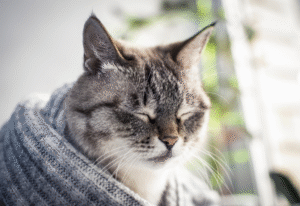February, 20, 2020
After being sick this week, I began to notice that I was struggling with my sleep patterns, noting that I gradually slept in later and later while having a harder time falling asleep at night, and realized that my circadian rhythm may be out-of-sync. As such, I decided to research ways to get it back on track, primarily by getting myself to sleep at a good hour and sleeping a full 8 hours.

What is a circadian rhythm?
A circadian rhythm is your body’s inner “clock,” controlling your sleep-wake systems. It repeats roughly every 24 hours, it can be found in almost every living thing, from humans to some bacteria, and controls the patterns in your hormone production, body temperatures, brain waves, the regeneration of your cells, and many other daily bodily functions. Although it’s built to be consistent, you can “reset” the clock — either accidentally or on purpose — thanks to things such as how much light you surround yourself with and the activities you do at night.
How do I know if my circadian rhythm is out-of-whack?
If you’ve ever traveled across a timezone and had to adjust to the new schedule or felt the effects of Daylight Savings, you’ve actually experienced the altering of your circadian rhythm as it fell out of sync with its norm. The biggest and easiest way to know its off its normal schedule is to know when you begin to get sleepy versus when you start to feel alert every day.
According to the National Sleep Foundation, “You won’t feel the dips and rises of your circadian rhythm as strongly if you’re all caught up on sleep. It’s when you’re sleep-deprived that you’ll notice bigger swings of sleepiness and alertness.” The feeling of fatigue and sleepiness you get when the clock shifts for a new timezone is the same feeling you’ll get if your rhythm is out-of-sync with your daily routine, only without the travel or Daylight Savings to trigger it.
Some symptoms you’ll experience include:
- falling asleep earlier than normal and waking again in the middle of the night
- feeling drowsy the whole day, only to be wide awake come bedtime
- having an erratic sleep schedule despite trying to keep it consistent
- struggling to stay asleep at night
- struggling to concentrate during the day
So how do I fix it?
There are a few different ways to fix your circadian rhythms, the easiest (in my humble opinion) seeming to be getting to sleep on time and resting well. If you get a full, good night’s rest, you wake feeling more alert and can go about your daily routine with more energy, therefore helping you make it to bedtime when you sleep well again. It takes a few days for your body to catch up to the shifts, but some methods for lulling yourself to sleep at night include food, light, activity, and prayer. I’ll explain more as we go, but first off…
Food
Every food is made with different chemical makeups, as we all know from our time at school, and some of these makeups can assist our bodies to sleep by giving a boost in the natural hormones, vitamins, minerals, and acids we need to fall asleep.
Such things to eat include (but are not limited to):
- dairy (such as yogurt, kefir, cheese, milk)
- meat (lean beef, chicken, turkey, tuna, salmon, tilapia)
- seeds and nuts (sesame, sunflower, pumpkin, flax, peanuts, almonds, cashews, pistachios)
- beans and grain (rice, barley, oats, lima beans, chickpeas)
- fruits and veggies (apples, bananas, prunes, cherries, avocados, olives, cucumber, spinach, broccoli, okra)
- tea (chamomile, peppermint, lavender, valerian, cherry) – note: check that they’re not flavored with artificial or natural flavorings
These foods contain things such as melatonin, vitamin B6, calcium, tryptophan, and magnesium that can all help you to sleep.
On the flip-side, things to avoid eating include:
- anything with caffeine
- spicy foods
- high-protein foods
- high-fat foods
- watery foods (watermelon, celery)
- any heavy or large meal or snack (i.e. dessert, midnight snack)
These kinds of foods are linked with restlessness, heartburn, bathroom breaks, and other such sleep-inhibiting things, so it’s best to eat them closer to the afternoon or early-evening at the latest.
Light
Light versus dark affects your sleep in huge ways. An absence of light sends signals to your body that it’s time to sleep, and therefore having too much light at the wrong times of day greatly messes with your body’s natural sleep functions. Follow the earth’s natural cues. This doesn’t mean you have to go to bed at 5pm if you live in the north and it’s January, but if you’re getting closer to bedtime, start turning off excess lights and keep your rooms — and devices — dim, especially in the last hour before sleep.
Activity
It should be no surprise that the amount and the way you move at different times during can affect how you sleep. For example, lifting heavy weights just before bed will likely result in sore muscles and poor sleep quality. Therefore it makes sense that if you want to sleep, you should do your exercising earlier in the day, specifically in the morning or early afternoon.
But there are more activities than just exercise and intense movement. Things such as cleaning a large part of your house, any heavy-lifting, or even arguing should be avoided in the hours before you sleep to promote restful Z’s.
Prayer
The last thing on my list is prayer. Up till now I’ve primarily focused on things that would be wise to avoid. This section, however, is the opposite. Stress is a major cause of restless sleep to many people. To combat this, as well as merely to help put your body and brain into a more restful, contemplative, and thankful attitude, I recommend the simple act of prayer.
Start Sleeping says “Many people are chronically under-rested, and one of the contributing factors is stress. And for many people, not sleeping well can create more stress, which creates a cycle that can be difficult to break. One of the core pillars of good sleep hygiene is reducing stress levels, and modern brain research supports the use of the practice of prayer.”
In conclusion, if you’re tired of being tired and alert at the wrong time of day, then over time, altering just part of your day to accompany these little habits into your late-evenings can help you to fix your circadian rhythms — just be sure to get up at a good hour and keep your consistent, even on weekends.
Until Abba gives me a new topic to speak on,

Leave a Reply